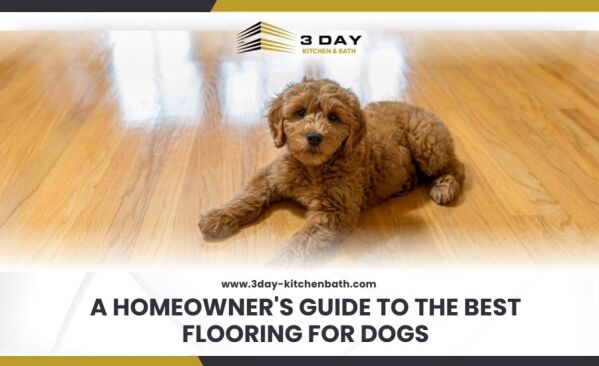The best flooring for dogs is Luxury Vinyl Plank (LVP) because it is waterproof, scratch-resistant, and comfortable under paws. Porcelain and ceramic tile are also top choices for their durability and easy cleaning. When selecting dog-friendly flooring, focus on four essentials: scratch resistance, water resistance, traction, and ease of maintenance.
Fortunately, you don't have to choose between a stylish home and a happy pet. By picking materials built for durability and real-world use, you can enjoy worry-free living. This guide walks you through the key factors for dog-friendly flooring and provides expert recommendations for every room in your home.
- What makes flooring dog-friendly?
- What is the best flooring for homes with dogs?
- Luxury Vinyl Plank/Tile (LVP/LVT)
- LVP Pros & Cons at a Glance
- Porcelain & Ceramic Tile
- Are hardwood or laminate floors good for dogs?
- Engineered Hardwood
- LVP Pros & Cons at a Glance
- Laminate Flooring
- Hardwood vs. Laminate vs. LVP:
- Engineered Hardwood Pros & Cons
- What flooring should you avoid with dogs?
- The Best Choice for Your Pack and Your Home
- Frequently Asked Questions
- What is the most durable flooring for large dogs?
- LVP Pros & Cons at a Glance
- Is vinyl or laminate better for dogs?
- What is the best flooring for dogs that shed a lot?
- Engineered Hardwood Pros & Cons
- Is LVP flooring toxic for pets?
- Laminate Pros & Cons
- How can I stop my dog's nails from clicking on the floor?
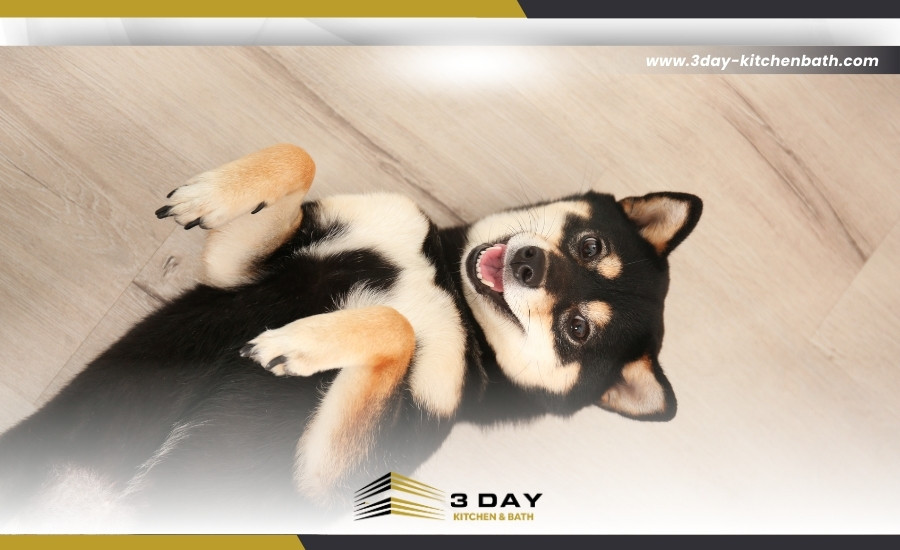
What makes flooring dog-friendly?
The best dog-friendly flooring excels in five key areas: scratch resistance, water resistance, safety, comfort, and ease of cleaning. Before choosing a material, you should judge it based on these criteria.
- Scratch & Scuff Resistance: This is how well the floor holds up to dog nails and toys. Materials with a strong, protective wear layer are critical for preventing unsightly scratches and scuffs.
- Water & Stain Resistance: From spilled water bowls to house-training accidents, moisture is a daily reality. A non-porous, waterproof floor is essential to prevent permanent damage, stains, and odors.
- Traction & Safety: A slippery floor can be dangerous for a dog, especially for seniors or breeds prone to joint issues. Good traction helps prevent injuries and keeps your pet safe and comfortable when they walk or play. Veterinarians also recommend using non-slip rugs or runners in high-traffic areas and keeping nails trimmed monthly, especially for senior dogs, to reduce slipping and nail clicking on hard surfaces.
- Comfort & Noise: Some flooring materials can be cold, hard, or loud underfoot. Consider if the surface is comfortable for your dog to lie on and if it absorbs or amplifies the sound of clicking dog nails.
- Ease of Cleaning & Maintenance: Dog ownership comes with fur, drool, and muddy prints. The right flooring should make cleanup simple and stress-free.
What is the best flooring for homes with dogs?
For most dog owners, LVP and porcelain or ceramic tile are the top choices for durability and peace of mind. These options handle almost anything a dog can throw at them.
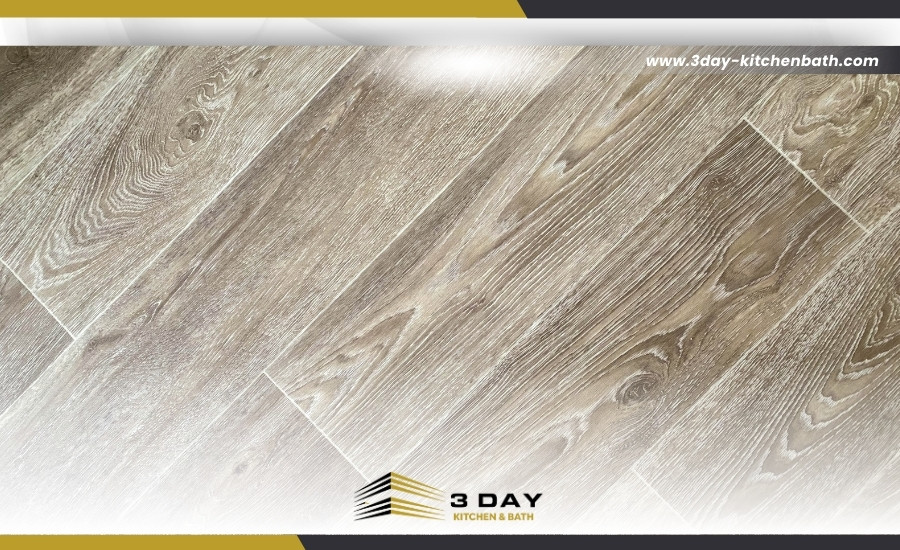
Luxury Vinyl Plank/Tile (LVP/LVT)
LVP is a top choice because it's waterproof, highly scratch-resistant, and comfortable for dogs.
- Why It's a Dog Owner's Dream: Luxury vinyl plank (LVP) features a multi-layer construction with a tough wear layer that resists scratches and scuffs. It is 100% waterproof, quiet underfoot, easy to clean, and provides good traction for paws. For the best durability, look for a high-quality LVP with a thick wear layer (20 mil or more) and an embossed texture, which adds grip.
- Perfect for Any Room: Because LVP is completely waterproof, it's an ideal choice for kitchens, bathrooms, and mudrooms where spills and moisture are common.
LVP Pros & Cons at a Glance
| Feature | Pros | Cons |
| Durability | Scratch-resistant wear layer | May dent under heavy furniture |
| Water Resistance | 100% waterproof | None |
| Comfort | Softer, warmer underfoot than tile | Still harder than carpet |
| Maintenance | Easy to clean (mop/sweep) | Can fade in direct sunlight |
| Aesthetic | Wide variety of styles & textures | Doesn't have the prestige of real wood |
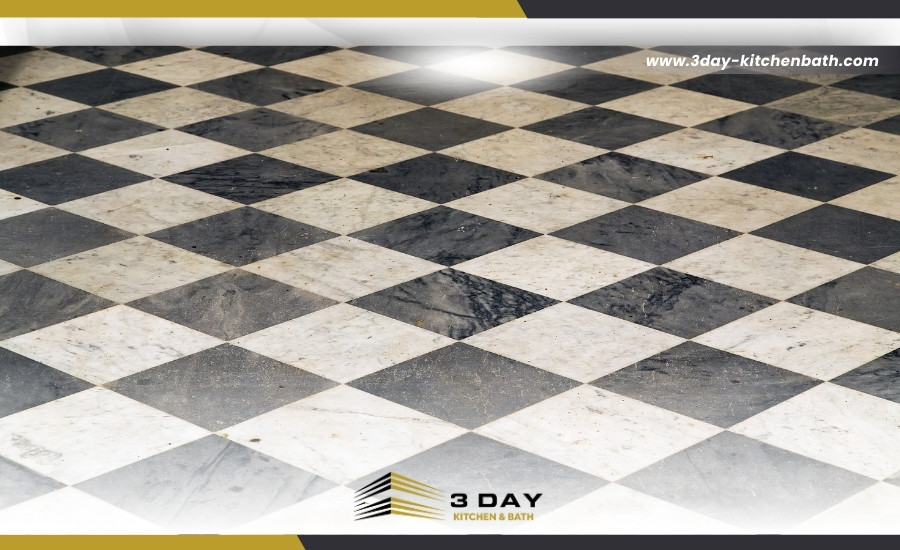
Porcelain & Ceramic Tile
Porcelain tile and ceramic tile are the most durable flooring options because they are virtually impossible to scratch and are impervious; however, proper assembly in wet areas requires a waterproofing membrane.
Cementitious grout should be sealed regularly to prevent staining, while epoxy grout typically does not require sealing, making it a great option for pet-heavy areas.
- The Undisputed Durability Champion: Tile's hard, glazed surface can withstand anything from a Great Dane's nails to dropped toys without a scratch. It is also completely waterproof, making it a worry-free option. As a classic choice for kitchens and baths, it can handle any pet-related mess and is easy to sanitize.
- Things to Consider: The two main downsides of tile for dogs are that it can be cold and hard underfoot, and the surface can be slippery. You can add area rugs for comfort or choose a tile with a textured surface for better traction. It's also important to seal the grout to prevent it from absorbing stains from accidents.
Are hardwood or laminate floors good for dogs?
Engineered hardwood and laminate can work in homes with dogs, but they need more care than vinyl or tile. These common flooring types can work in a home with dogs, but it's important to know their limitations.
Engineered Hardwood
Engineered hardwood offers the timeless beauty of real wood, but it is not waterproof and will inevitably show some scratches over time.
- Why It Can Work: It is more stable than solid hardwood and holds up better to changes in humidity. Choosing a harder wood species like Oak or Hickory with a durable, factory-applied finish will offer the best scratch resistance.
- The Risks: This flooring is not waterproof. Any spills or accidents must be wiped up immediately to prevent the wood from warping or staining.
Engineered Hardwood Pros & Cons
| Feature | Pros | Cons |
| Appearance | Natural, timeless beauty | Shows scratches more than LVP/tile |
| Durability | More stable than solid hardwood | Not scratch-proof |
| Water Resistance | Some resistance to humidity | Not waterproof; spills cause damage |
| Comfort | Warmer underfoot than tile | Harder than carpet |
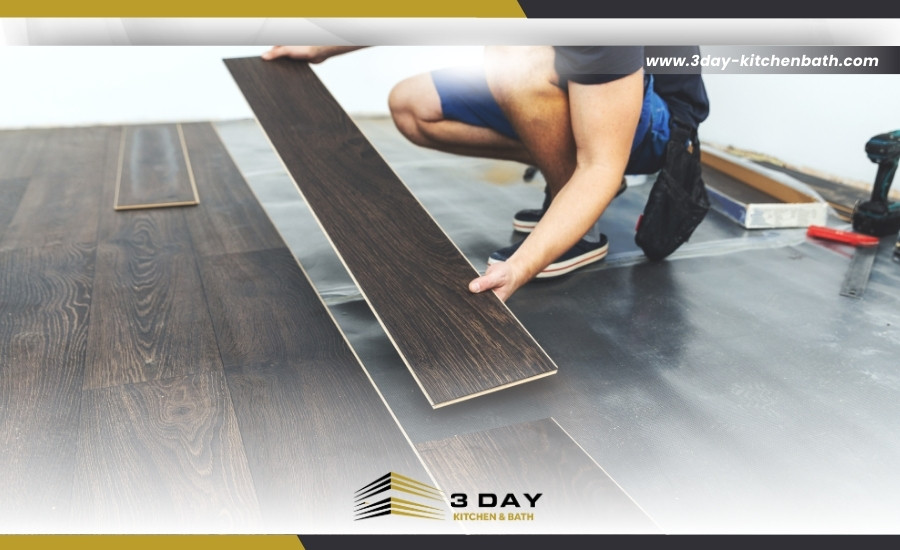
Laminate Flooring
Laminate flooring is highly scratch-resistant, but most types are not waterproof, which is a significant risk with pets.
- The Pros: The top layer of laminate is exceptionally tough and easy to clean, making it great for resisting scratches and shedding.
- The Cons: Most standard laminates are not waterproof. Water can seep into the seams and cause the inner core to swell, ruining the floor permanently. Cheaper laminate can also be very slippery for dogs. If you consider laminate, look only for newer products labeled "water-resistant" or "waterproof," though LVP is often a superior choice.
Laminate Pros & Cons
| Feature | Pros | Cons |
| Durability | Highly scratch-resistant surface | Core vulnerable to water damage |
| Maintenance | Easy to clean | Cheap laminate is slippery |
| Appearance | Mimics wood look at lower cost | Less realistic than hardwood |
| Water Resistance | Some new products are water-resistant | Most standard laminate is not |
Hardwood vs. Laminate vs. LVP:
For many homeowners, the real challenge is deciding between engineered hardwood, laminate, and vinyl plank. Here's how they stack up side by side:
| Feature | Engineered Hardwood | Laminate | LVP (Vinyl Plank) |
| Durability | Scratch-prone over time | Scratch-resistant | Highly scratch-resistant |
| Water Resistance | Not waterproof | Some water-resistant options | 100% waterproof |
| Comfort | Warm, natural feel | Hard surface | Softer, warmer than tile |
| Maintenance | Needs quick cleanup | Easy to clean, but seams vulnerable | Very low maintenance |
| Cost | Higher | Moderate | Moderate |
| Best For | Natural wood lovers | Budget-conscious homes | Pet owners & busy families |
What flooring should you avoid with dogs?
For homes with dogs, it's best to avoid solid hardwood, carpet, and porous natural stones like marble. These materials are poor choices for a home with dogs because they are easily damaged and difficult to maintain.
- Solid Hardwood: It is highly susceptible to scratches from dog nails and can be permanently damaged by water or pet stains.
- Carpet: This material traps pet dander, allergens, stains, and moisture, which can lead to lingering odors and mold growth.
- Marble/Natural Stone: Many types of natural stone are porous and prone to staining/etching and can scratch from tracked-in grit. They can also be easily scratched.
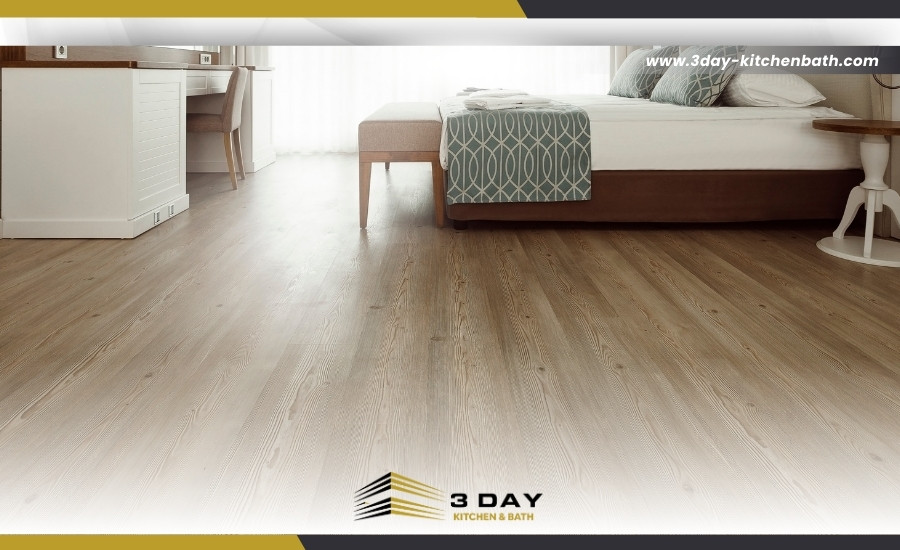
The Best Choice for Your Pack and Your Home
For the ultimate peace of mind in a home with dogs, Luxury Vinyl and Porcelain Tile are the clear winners. They offer the best combination of durability, water resistance, and ease of cleaning. Ultimately, the perfect flooring choice also depends on your family's lifestyle, budget, and aesthetic preferences.
At 3 Day Kitchen & Bath, our expert contractors can help you weigh the key factors to find a floor that you and your dog will love for years to come. Ready to find the perfect dog-friendly flooring for your home? Schedule your free, no-obligation design consultation today!
Frequently Asked Questions
What is the most durable flooring for large dogs?
Porcelain Tile and high-quality LVP are the top choices. Their hard, resilient surfaces resist scratches from the nails of large, heavy dogs better than any other option.
Is vinyl or laminate better for dogs?
For overall performance, vinyl (LVP) is better. While new laminate has high scratch resistance, its core is still vulnerable to moisture from spills or accidents, making waterproof LVP a safer, more durable choice.
What is the best flooring for dogs that shed a lot?
Any smooth, hard surface like LVP, tile, or laminate is ideal. Unlike carpet, they don't trap fur, allowing you to easily clean it up with a quick sweep or vacuum.
Is LVP flooring toxic for pets?
Reputable brands are FloorScore certified for low VOCs (Volatile Organic Compounds) and are perfectly safe for all members of your family, including pets.
How can I stop my dog's nails from clicking on the floor?
LVP is a great choice as it absorbs more sound than harder surfaces. For any floor, keeping your dog's nails properly trimmed is the most effective way to reduce clicking sounds.

